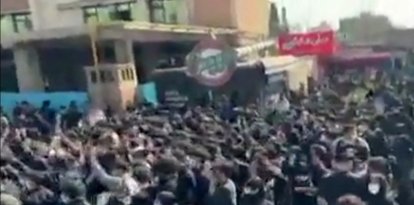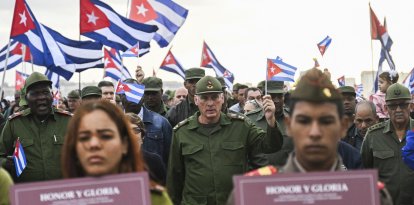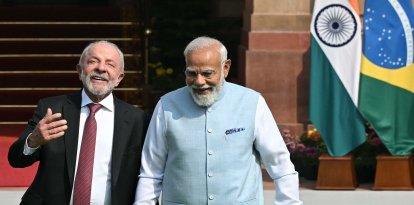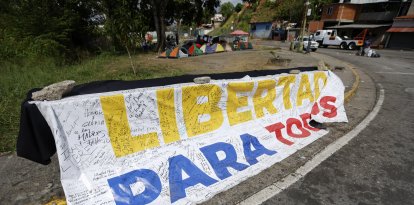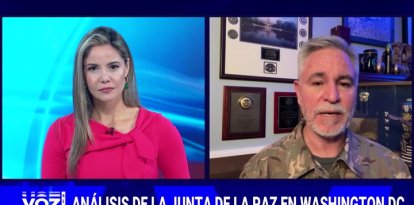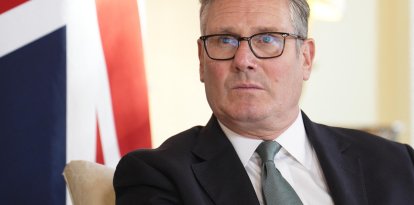Trump plans to crack Iran's economy with aggressive 'maximum pressure' policy
The strategy would include a series of strict sanctions, especially targeting Iran's oil sector, one of the country's primary sources of revenue.

U.S. President-elect Donald Trump.
U.S. President-elect Donald Trump aims to get Iran to halt its nuclear program and cut off funding to militant groups in the region. According to sources close to the transition team, the new administration plans to revive the "maximum pressure" policy, which characterized Trump's first term, to suffocate Tehran and force it to negotiate economically.
The strategy would include a series of strict sanctions, especially targeting the Iranian oil sector, one of the country's primary sources of revenue. "He’s determined to reinstitute a maximum pressure strategy to bankrupt Iran as soon as possible," a national security expert said. Such a move would severely impact the Iranian economy, which is already weakened due to sanctions imposed in previous years and the domestic economic crisis.
Change in U.S. foreign policy
Trump's approach represents a shift in foreign policy from the outgoing administration, which sought to revive the 2015 nuclear deal to ease tensions with Iran. The president-elect's stance, however, points to a hardening and international isolation of Tehran, intensifying economic and political measures to limit its ability to enrich uranium.
In his campaign, Trump signaled his desire to reach a new agreement with Iran, but under stricter conditions. "We have to make a deal, because the consequences are impossible. We have to make a deal," he commented in September. However, analysts see this possibility as remote, given the deterioration of bilateral relations following the attack ordered by Trump in 2020 that resulted in the death of Iranian commander Qassem Soleimani.
Preparations for new sanctions
The transition team is already drafting executive orders that could take effect on the first day in office. These would include secondary sanctions to limit Iranian crude exports, especially those aimed at China, a major buyer of Iran's oil. "They could knock Iran’s oil exports back to a few hundred thousand barrels per day," warned Bob McNally, a former energy adviser to the George W. Bush administration.
Mike Waltz, national security adviser to the president-elect, has been a critical voice in Congress regarding Iranian crude exports and has promoted legislation to impose sanctions on those who buy oil from the Persian country.
Iran's reaction to the threat of new sanctions
The Iranian regime, led by reformist President Masoud Pezeshkian, has expressed its intention to resume dialogue with the West but has rejected bullying tactics. Abbas Araghchi, Iranian foreign minister, urged Trump to avoid repeating the policy of maximum pressure. "Attempting ‘Maximum Pressure 2.0’ will only result in ‘Maximum Defeat 2.0,’" he warned on the X social network, referring to Iran's nuclear advances since the end of the nuclear deal.
Tehran has suggested its willingness to negotiate, but under conditions they say respect their rights. We are willing to negotiate "based on our national interest and our inalienable rights, but NOT ready to negotiate under pressure and intimidation!" Araghchi said after meeting Rafael Grossi, head of the U.N. nuclear watchdog in Tehran.
Uncertain scenario for negotiations
Although both sides seem willing to dialogue, reaching an agreement is uncertain. Experts believe that mutual distrust and opposing interests will hinder progress. "It is hard to imagine a nuclear or regional agreement that would be acceptable to both the prime minister of Israel and the supreme leader of Iran," commented Karim Sadjadpour, a fellow at the Carnegie Endowment for International Peace.
Amid this backdrop, recent reports suggest that Trump may be considering a diplomatic track. A meeting between Elon Musk and the Iranian ambassador at the U.N. has generated speculation about a possible rapprochement to reduce tensions. However, the Iranian mission has not commented on the meeting, nor has the Trump campaign issued statements.













